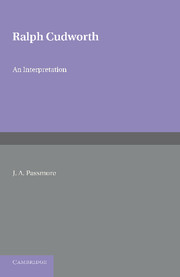Book contents
- Frontmatter
- Contents
- Preface
- Abbreviations
- CHAPTER I Cudworth and his Predecessors
- CHAPTER II Cudworth on Mind and Nature
- CHAPTER III Cudworth's Theory of Knowledge
- CHAPTER IV ‘Eternal and Immutable Morality’
- CHAPTER V Cudworth's Moral Psychology
- CHAPTER VI The Good Life
- CHAPTER VII Ethics and Religion
- CHAPTER VIII Cudworth and the British Moralists
- Appendix: The Cudworth Manuscripts
- A Cudworth Bibliography
- Index of Names
Preface
Published online by Cambridge University Press: 05 June 2016
- Frontmatter
- Contents
- Preface
- Abbreviations
- CHAPTER I Cudworth and his Predecessors
- CHAPTER II Cudworth on Mind and Nature
- CHAPTER III Cudworth's Theory of Knowledge
- CHAPTER IV ‘Eternal and Immutable Morality’
- CHAPTER V Cudworth's Moral Psychology
- CHAPTER VI The Good Life
- CHAPTER VII Ethics and Religion
- CHAPTER VIII Cudworth and the British Moralists
- Appendix: The Cudworth Manuscripts
- A Cudworth Bibliography
- Index of Names
Summary
This is not the book I intended to write. My original purpose was to study the historical development of ethical rationalism in England, from Cudworth to the present day, in an attempt to understand its persistent vitality. I began to read the Cudworth manuscripts in the expectation that they would confirm the traditional account of his ethics, and would allow me to write of him as the first English representative of modern rationalism. But once the initial difficulty of sorting out the manuscripts had been overcome, an ethics began to emerge which looked very different from the ‘Cudworth's ethics’ of the text-books. With this clue, I returned to the study of his printed books. I thought I could now discern the outlines of a theory which was both interesting in itself and historically of very considerable importance. This book presents that theory. It is, then, primarily a work of historical excavation.
The brevity of the book is deliberate. Cudworth is not a first-order genius, whose every word must be scrutinized with care. It would be absurd to trace out every change in the movement of his thought, to mention every inconsistency into which he falls, or to expound his views on matters which are not now of the slightest interest to anyone. There are obvious dangers in a policy of selection; but Cudworth must somehow be rescued from his own wordiness. No doubt other Cudworths could be hewn out of the great mass of his work; I hope I have not ascribed to him any views which he at no time held, but I do not pretend to be presenting every view he at any time maintained. I have not hesitated to modernize spelling, punctuation, capitalization; the reader of Cudworth has enough obstacles to overcome, even in a modernized text.
The first and last chapters are primarily historical. The first chapter sets out to destroy the current ‘stereotype’ of Cudworth, which pictures him as an antiquarian, remote, in his Cambridge isolation, from the philosophical controversies of his own time. The last chapter sketches his influence on Locke, Shaftesbury, Clarke and Price. The fifth, sixth and seventh chapters describe, critically, the ethico-religious doctrines of the manuscripts; this is the heart of the book. The remaining chapters outline Cudworth's general philosophy, especially in so far as it is relevant to the understanding of his ethics.
- Type
- Chapter
- Information
- Ralph Cudworth , pp. vii - ixPublisher: Cambridge University PressPrint publication year: 2013

